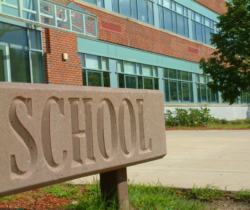
Last week, the Trump administration revoked the policy that limited immigration enforcement actions “in or near a location that would restrain people’s access to essential services or engagement in essential activities,” known as “protected areas.” Protected areas included hospitals, schools, daycare centers, and churches, among other places. When in place, the protected areas policy did not limit enforcement actions from occurring. Rather, the policy recognized that immigration enforcement agencies could conduct their enforcement duties “without denying or limiting individuals’ access to needed medical care, children access to their schools, the displaced access to food and shelter, people of faith access to their places of worship”.
This decision is not only reckless and dangerous but also will have lasting consequences for infants, children, and families in Arkansas and the country more broadly. Policies creating “protected areas” go back decades, before the existence of Immigration and Customs Enforcement (ICE) and the Department of Homeland Security. Rescinding these long-standing understandings and leaving immigration enforcement up to “common sense,” is bad policy and will lead to dangerous consequences.
We know what will happen. We saw this in 2017, when essentially all immigrants were made priorities for deportation. School enrollment of children from immigrant families went down, especially once parents were arrested by ICE when dropping off or picking up their children at school. Both the mother and father of a two-month-old child who needed surgery were arrested by ICE officers after a hospital employee reported them for being undocumented. They were put under intensive monitoring while their two-month-old son was awaiting a critical life-saving procedure. ICE officers detained a 10-year-old girl with cerebral palsy after an emergency gall bladder surgery, took her into custody, and put her into proceedings. We also know that the widespread raids that were supposed to target “dangerous criminals” instead had the effect of capturing immigrants with traffic infractions. The fear of deportation and separation is compounded for families given that we also know that the federal Department of Homeland Security is still unable to account for an unknown number of children, possibly as high as 1,000, who were separated from their families eight years ago. Records are not available despite lawsuits and court orders.
When you trigger mass immigration raids while simultaneously removing the ability of people to receive important medical treatment, send their children to school knowing it’s safe for them, access food, and attend their religious institutions, it doesn’t make our communities safer. Instead, it demands that states address dangerous and bad federal policies that we already know don’t work. This will make it harder for families with complex needs to care for their children. It will terrorize parents who will wait at the bus stop wondering if their child will come home. It will also traumatize children who will fear coming home to missing parents.
Children, who collectively continue to be under high levels of stress and face higher rates of depression and suicide in the past few years, will be under more stress. This will result in a greater need for mental health services, which in Arkansas are already over-strained. Further, individuals with major medical issues will wait until the last moment to get assistance knowing that it could alter their entire life if they are reported to ICE by a hospital worker who is supposed to be helping them. Families will have to decide whether it is worth sending their child to school if they may be the target of a raid.
Families under these pressures do not give up and leave the United States. Instead, they suffer, and their communities suffer with them. People who are U.S. citizens are not excluded from this suffering. An estimated “4.7 million households are home to undocumented residents and US citizens or others with legal status.” These policies not only threaten to break up families but also threaten to deport U.S. citizens with their family members who lack status. U.S. citizens will also be caught up in enforcement actions, like the U.S. military veteran detained without a warrant on January 24, 2025, in Newark, New Jersey.
Formerly protected areas should review their policies and ensure they update them, understanding what can and can’t be done by immigration officers even under this policy decision and the administration’s executive orders. Look to agencies who do this work to have accurate and usable information, such as the National Immigration Law Center (NILC), the American Civil Liberties Union (ACLU) Immigrant’s Rights Project, and consult with an attorney about any policy changes that you plan to make to ensure protection of your students, patients, and community members. State-based organizations such as ACLU Arkansas, Arkansas Immigrant Defense, Arkansas United, and Venceremos are working to ensure that immigrants, their families, and others in the community know their rights.
Meanwhile, we anticipate state-level legislation that would have local, and state officials aid in arrests, raids, and detention of immigrants in Arkansas, as well as other anti-immigrant proposals. You can keep up with legislation we’re tracking on our website and sign up for newsletters and action alerts here.
